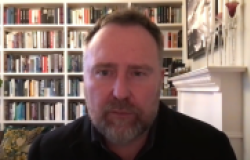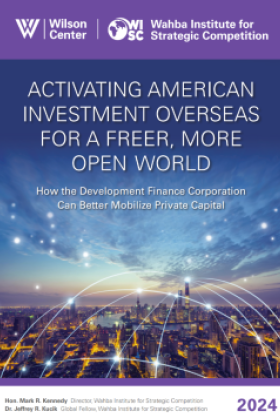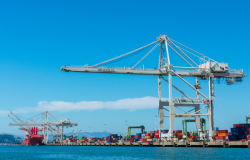Why Fighting Crime Can Assist Development in Africa
A Director's Forum with Antonio Maria Costa, Executive Director of United Nations Office on Drugs and Crime, for the launch of a new report: Crime and Development in Africa. Download this report.
Overview
Antonio Maria Costa, Executive Director, United Nations Office on Drugs and Crime
Moderator: Howard Wolpe, Director, Africa Program and the Project on Leadership and Building State Capacity
Antonio Maria Costa, Executive Director of the United Nations Office on Drugs and Crime unveiled his organization's newest report—an overview of Crime in Africa—at a Director's Forum at the Woodrow Wilson International Center. The report, entitled Crime and Development in Africa argues persuasively that, in Africa, crime is both a cause and a symptom of chronic underdevelopment. The growing inequalities between the wealthy and the poor in Africa, as well as the continent's booming cities and large youth population have made the situation particularly volatile. This is complicated widely perceived police corruption and inefficiency—according to the UNODC report, only 11% of homicide cases in Africa end with a conviction, versus 63% in Asia and 69% in Europe.
Besides poverty, another contributing factor is the continent's civil wars—in 2000, 50% of global war deaths occurred in Africa. The instability caused by armed conflict also creates openings for large-scale organized crime, which profit from the smuggling of, drugs, persons and weapons. While drug use in Africa consists primarily of locally produced cannabis, relatively lax customs services have made the continent an increasingly attractive transit point for narcotics en route to European and American markets. Human trafficking has become an issue of increasing concern among African police and politicians, but there must be greater cooperation by police forces in developed countries, as roughly half of all trafficked humans are destined for Europe.
With regard to arms trafficking, Africa has relatively few light arms overall, although an accurate estimate is nearly impossible. However, the smuggling and "recycling" of weapons between conflict zones, the large percentage (81%) of light arms in private hands, and the "disappearance" of military and police weapons mean that firearms are readily available, and give Africa one of the highest rates of gun violence. Additionally, while much weaponry is imported from developed and former Soviet countries, 10 African countries have the ability to produce firearms and ammunition domestically, and illicit handgun industries have been reported in Ghana, South Africa and elsewhere.
Beyond international crime, so-called "conventional crime"—including murder, assault, and burglaries also pose serious obstacles to African development. Security concerns drive away foreign direct investment, and financial crimes and corruption lead Africans to send their wealth abroad—nearly 40% of the continent's private wealth is invested overseas. In many countries, companies report that bribes cost as much as 5-10% of total revenue, and in many countries, the shadow economy comprises 40%-60% of GDP.
He closed his prepared remarks on an optimistic note, praising several countries for having adopted a tough policy against corruption, notably South Africa and Nigeria (both countries have recently sacked high-level figures for corruption) and expressed his hope that the issue of crime and corruption would come to the fore when leaders discuss African assistance at the upcoming G8 Summit.
Howard Wolpe began the question-and-answer session with a discussion and question about the role of "grand corruption" in natural resource management—notably in the petroleum sector. Costa replied that corruption is always a two-way street, particularly when it is large scale—developed countries must cooperate in forcing their companies to be more transparent on their dealings with regimes, and harsher on those companies and individuals paying bribes, just as African leaders must be harsher on the corrupt officials that take the bribes.
Nuhu Ribadu, Chairman of the Economic and Financial Crimes Commission of Nigeria gave a brief commentary, explaining that corruption is at the root of many of Africa's problems—if governments can uproot corruption in their police and civil service, the improved efficiency will go a long way towards ending killings, robberies and other crimes that are now carried out with impunity. Furthermore, many of Africa's civil wars have been caused by "gangsters" who wish to control the state, in order to get rich through corruption. Corruption and a poor civil service have debased Africa's image in the world, and been the cause of much of the continent's troubles. In order to overcome these problems, he asked that developed countries support Africans in their fight against corruption, that they help bring corrupt leaders to justice, and that they seize and return funds that have been stolen through corruption and invested in Western bank accounts—a sum he said could reach as high as $100 billion.
Questions from the audience focused on the twin topics of the ways in which donors can assist in the fight against crime in Africa, and how factors contributing to high crime rates can be eliminated. On the first topic, Costa observed that donors must recognize that crime fighting is a good investment, and must work with police and security forces in order to combat the alarming crime rates. However, they must also recognize that by acknowledging the need for better enforcement, they are also acknowledging that they are failing in other ways—enforcement is crucial, but it is still a "plan B" solution. The economic causes of crime must be addressed, in order to reduce the demand for enforcement techniques.
At audience members' suggestions, Costa reflected on several possible strategies to reduce the demand for enforcement, including improving rural opportunities in order to stem the tide of uncontrolled urbanization, promoting microenterprise in order to provide young entrepreneurs legal moneymaking opportunities, and greater regional integration via the African Union, whose anti-crime office is currently well-intentioned but under-resourced.
Michael Jobbins, Africa Program Associate ext. 4158
Howard Wolpe, Director
Hosted By

Africa Program
The Africa Program works to address the most critical issues facing Africa and US-Africa relations, build mutually beneficial US-Africa relations, and enhance knowledge and understanding about Africa in the United States. The Program achieves its mission through in-depth research and analyses, public discussion, working groups, and briefings that bring together policymakers, practitioners, and subject matter experts to analyze and offer practical options for tackling key challenges in Africa and in US-Africa relations. Read more
Thank you for your interest in this event. Please send any feedback or questions to our Events staff.










